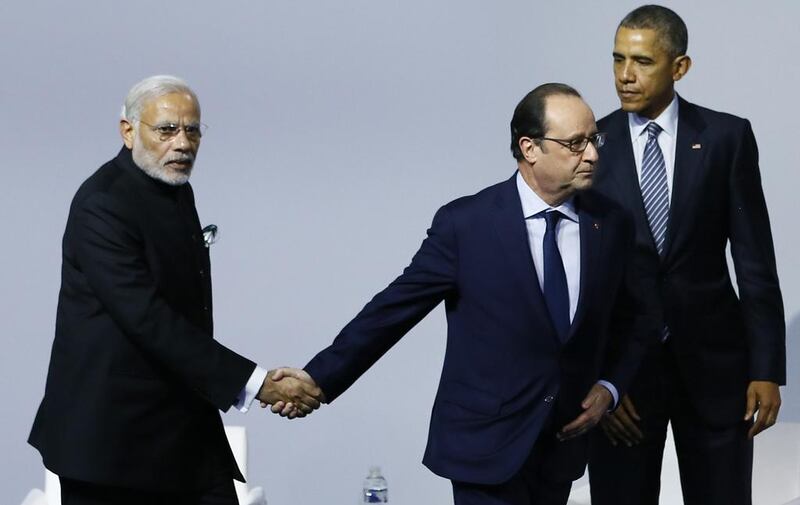NEW DELHI // Indian prime minister Narendra Modi, together with French president Francois Hollande, has announced an international solar energy alliance of 120 countries, hailing it “the sunrise of new hope”.
The grouping aims to raise US$400 million (Dh1.5 billion) from member countries and multilateral agencies, such as the World Bank, to invest in solar power research and usage, address regulatory issues, and draft universal standards.
“The dream of universal access to clean energy is becoming more real,” Mr Modi said at the climate change summit in Paris on Monday. “This will be the foundation of the new economy of the new century.”
Mr Hollande, meanwhile, described the alliance as “an avant-garde of countries that believe in renewable energies”.
The alliance, largely made up of countries that lie between the Tropics of Cancer and Capricorn and which receive abundant sunlight throughout the year, will be headquartered in New Delhi. Mr Modi’s government has earmarked $30m to build its secretariat.
The Indian prime minister mooted the idea of such an alliance during a summit between India and African nations in New Delhi last month.
By demonstrating the commitment of so many countries to solar power, the alliance also hopes to inspire companies to develop more low-cost solar solutions.
"A big piece of it will be to work with the World Bank and certain other large lenders to create loans for large solar developers, so that they can set up plants," Namit Arora, who recently led the drafting of a solar energy policy for the local New Delhi government, told The National.
A number of companies have also signed on to work with the alliance. These include Areva, Tata Steel and HSBC.
Together with China and the US, India is one of the top polluters in the world.
The Indian government has committed to generating 40 per cent of its power from renewable energy sources by 2030, and to installing at least 175 gigawatts of renewable energy by 2022. Roughly 100 gigawatts of this renewable energy will come from solar.
Currently, India has just over 4 gigawatts of installed solar power capacity.
Mr Modi has been enthusiastic about solar energy and in January set an investment target of $100 billion in India’s solar sector by 2022.
He also encouraged the development of solar power while chief minister of Gujurat province, overseeing the installation of 900 megawatts of solar power capacity.
Mr Arora said that the new alliance would benefit India in particular.
“One problem here is that there is very little solar panel manufacturing in India today. Most of what we use comes from China,” he said.
“This will create incentives for companies here to create solar panel manufacturing businesses. They’ll be tempted by the addition market in, say, Africa, where a lot of villages are still off the grid. This will be a good opportunity to flood rural parts of the world with solar energy.”
The India-led solar alliance was part of a range of commitments to renewable energy made in the lead-up to the Paris summit.
As part of another commitment, 19 countries, including the US, pledged $20bn for clean energy research, with the money to be disbursed in the next five years.
Bill Gates and Mark Zuckerberg, the founders of Microsoft and Facebook, have also launched the breakthrough energy coalition, an investment platform that will fund clean energy technology.
ssubramanian@thenational.ae





